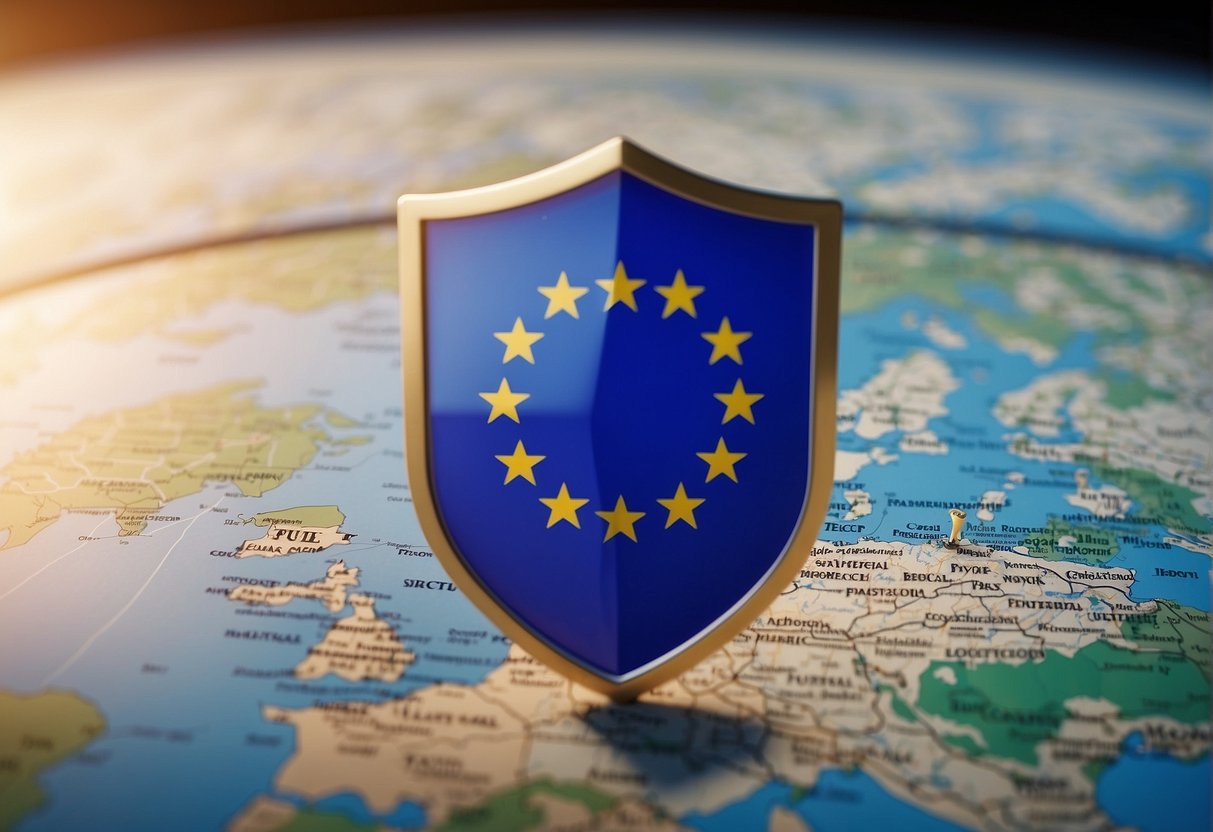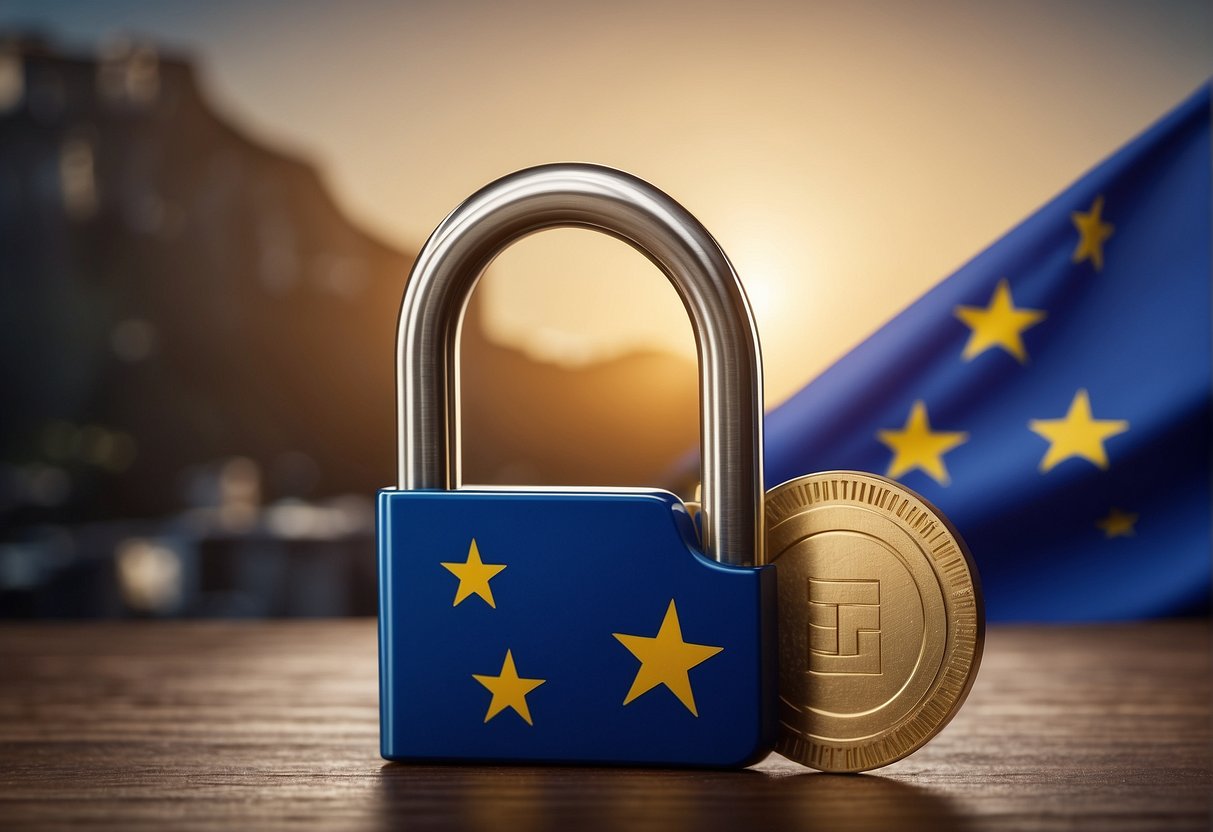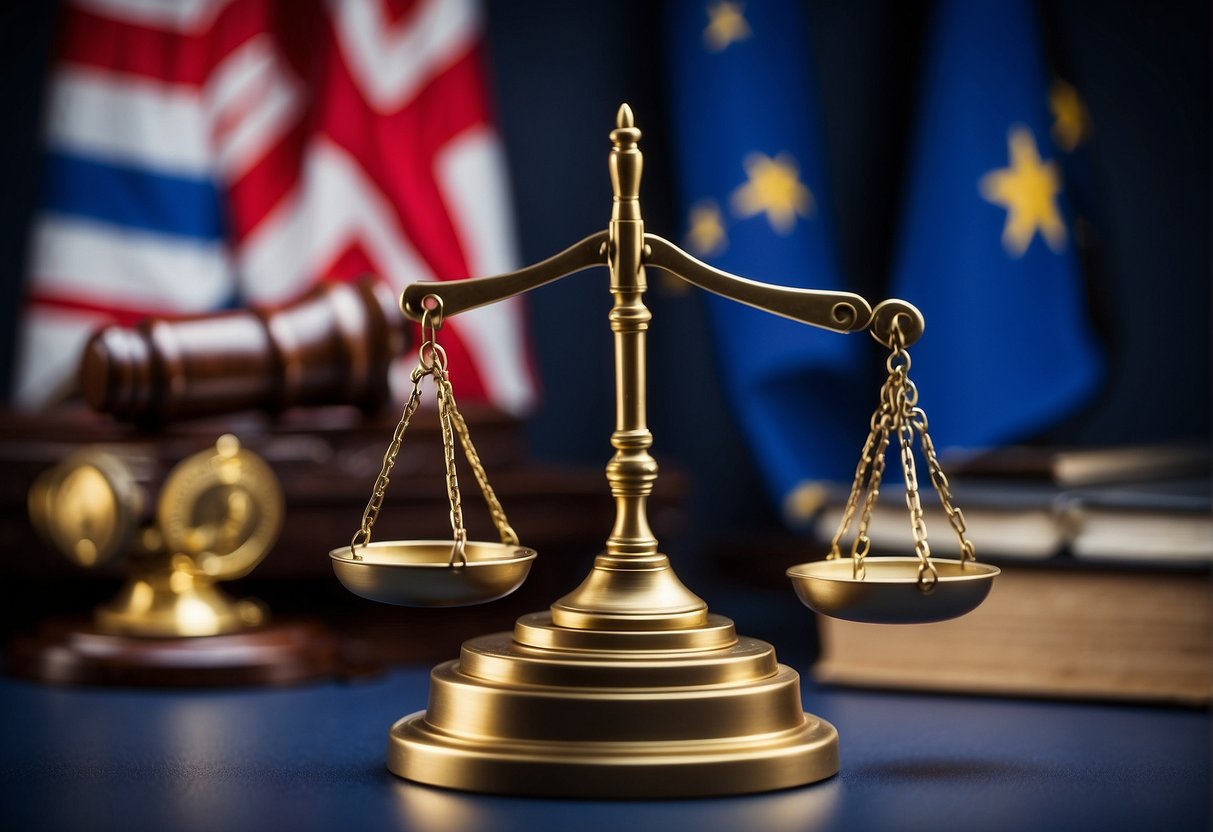As businesses expand across the globe, understanding and adhering to the diverse EU Digital Regulations becomes a critical challenge, particularly in the realm of digital law. For non-EU businesses looking to operate within the European market, the complexities of EU regulations demand thorough navigation. The EU has been at the forefront of digital regulation with comprehensive policies such as the General Data Protection Regulation (GDPR) and recent legislation, including the Digital Services Act (DSA) and Digital Markets Act (DMA), which creates a unified digital market.

Knowing how to comply with these regulations strengthens a company’s ability to trade within the EU while protecting consumer rights. This is not just about avoiding penalties but also about leveraging regulatory compliance as a competitive advantage. Our understanding of the EU’s digital regulatory framework equips us with insights into compliance requirements for non-EU businesses aiming to offer digital services and content, manage data governance and protection, and deploy artificial intelligence within the EU market.
Understanding EU Digital Regulations
Entering the EU market means navigating a complex and evolving digital regulatory framework. Non-EU businesses need to comprehend these regulations to operate effectively and legally within the European Single Market.
Digital Services Act and Digital Markets Act
The Digital Services Act (DSA) and Digital Markets Act (DMA) are two significant legislative proposals being introduced in the EU. Their objective is to create a safe digital space where the fundamental rights of users are protected and to establish a level playing field for businesses. The DSA focuses on addressing illegal content and transparent moderation, while the DMA targets large tech platforms—referred to as “gatekeepers”—to prevent them from imposing unfair conditions on businesses and consumers.
Legislative Framework and Scope
Non-EU businesses must understand the EU’s legislative framework, which includes regulations directly applicable to member states and directives that require transposition into national law. The scope of digital legislation encompasses data protection, e-commerce, and consumer protection laws. Regulations are designed to facilitate digital transformation by ensuring that digital service providers operate within a framework that protects EU citizens’ rights.
Single Market and Harmonised Rules
The backbone of EU digital regulation is its Digital Single Market strategy, aiming to ensure the free movement of goods, services, and capital. Through harmonised rules, the EU strives to eliminate barriers and create an environment where businesses can scale up and innovate. This connectivity allows non-EU companies to reach consumers across the entire EU without having to navigate a patchwork of national laws.
“We often see non-EU businesses struggling to keep pace with the EU’s stringent digital regulations. It’s our core mission to decode these complex legalities so that our clients can focus on what they do best—innovating and growing their business within this vibrant marketplace,” remarks ProfileTree’s Digital Marketing Team. By keeping these key regulations in mind, businesses can strategically align their operations to comply with EU standards and take full advantage of the opportunities within the digital single market.
Compliance Requirements for Non-EU Businesses
Non-EU businesses must be well-versed in GDPR mandates, focusing on designating a legal representative within the EU, understanding VAT and customs rules, and adhering to consumer protection and conformity standards.
Legal Representative and Points of Contact
Businesses outside the EU are required to appoint a legal representative within the EU. This representative serves as a local point of contact, facilitating communications with data protection authorities and ensuring compliance with GDPR. This measure is crucial for transparency and accountability when handling the personal data of EU citizens.
VAT and Customs Regulations
When it comes to cross-border transactions, non-EU entities must navigate intricate VAT and customs regulations. They are obligated to register for VAT in the EU country of import and comply with the corresponding tax obligations. Comprehending these directives is essential to avoid costly penalties and ensure smooth operations.
Consumer Protection and Conformity Standards
Non-EU companies must ensure their products and services meet EU consumer protection laws and conformity standards. These include safety regulations, providing clear instructions, and ensuring product conformity. It is imperative for these businesses to thoroughly understand and fulfil these requirements to maintain market access and consumer trust.
Digital Services and Content Regulation
In the European Union, non-EU businesses must navigate a complex framework for digital services and content regulation. Key areas to understand include content moderation, notice and action procedures, and platform responsibilities.
Content Moderation and Liability
EU regulations mandate that online platforms engage in content moderation to combat illegal online content while protecting users’ rights. For non-EU businesses, understanding this liability shield is critical. The Digital Services Act outlines conditions under which providers of digital services are exempted from liability for hosting illegal content, provided they act swiftly upon notice of such content.
Notice and Action Mechanisms
The notice and action mechanism is a pivotal process companies must establish for users to report unlawful content. Effective systems ensure that reports are handled promptly and in compliance with EU standards. This mechanism should be transparent, ensuring that all actions are justified and communicated to the users affected.
Responsibilities of Online Platforms
Responsibilities of online platforms extend beyond merely reacting to notices. They are required to proactively prevent the dissemination of illegal goods, services, or content. Regular risk assessments, transparent user policies, and systems to protect essential services are fundamental components that non-EU businesses must also implement to operate within the EU’s digital marketplace.
Data Governance and Protection

The landscape of digital regulations within the EU continues to evolve, impacting how non-EU businesses handle data governance and protection. Strict guidelines and regulations such as the GDPR and the Data Governance Act set the benchmark for data processing and reuse, demanding compliance from any entity operating within the single market.
General Data Protection Regulation (GDPR)
The General Data Protection Regulation (GDPR) sets a stringent standard for data privacy and security. We need to ensure that businesses outside the EU comply with its requirements when handling EU citizens’ data. Key GDPR principles include data minimisation, which requires that only the necessary personal data for a specific purpose is processed, and user consent, ensuring individuals agree to the data processing activities.
Key Rights of Individuals
- Right to Be Informed: Individuals must know who is collecting their data and why.
- Right to Access: Individuals can request a copy of their personal data.
- Right to Rectification: Individuals can correct inaccurate personal data.
- Right to Erasure: Also known as the ‘right to be forgotten’.
Fines for non-compliance can reach up to 4% of annual global turnover or €20 million, whichever is greater. As “ProfileTree’s” Digital Marketing Team observes, it’s not just about avoiding penalties; it’s about building trust with users by showing commitment to protecting their data.
Data Governance Act
The Data Governance Act (DGA) is a legislative framework that supports the GDPR by regulating data intermediaries and encouraging data sharing for the common good. It establishes measures for data sharing across different sectors and borders within the EU. Notably, for non-EU businesses, the DGA facilitates a trustworthy data-sharing environment, which helps foster innovation and growth.
Main Pillars of the DGA
- Neutrality: Data intermediaries must act in users’ best interest.
- Transparency: Clear protocols for data access and use must be established.
- Data Altruism: Voluntary data sharing for societal good is encouraged.
As Ciaran Connolly, ProfileTree Founder, comments, “Understanding the Data Governance Act is pivotal for non-EU businesses wishing to participate in the thriving digital economy of the EU. It’s not just a regulatory hurdle; it’s a gateway to new opportunities.”
Data Reuse and Privacy
Data reuse in the context of EU regulation emphasises privacy and the secure handling of data. Businesses are required to protect personal and non-personal data alike. The reuse of non-personal data is encouraged to unleash innovation, yet it must be done without compromising individual privacy rights protected under GDPR.
Effective strategies for data reuse involve
- Ensuring anonymity when processing and sharing datasets.
- Adhering to technical standards for interoperability.
ProfileTree’s Web Development Team would stress that any platforms or infrastructures developed for data processing must be built with privacy by design, ensuring that they meet the robust requirements of both the GDPR and DGA from the outset. This upholds privacy and fosters a secure data-sharing environment.
Artificial Intelligence in the EU Market

To successfully operate within the EU market, non-EU businesses must navigate a complex regulatory environment, particularly for AI systems which are subject to the EU’s comprehensive AI Act.
Artificial Intelligence Act
The EU AI Act represents a major regulatory framework aimed at safeguarding fundamental rights while fostering innovation. It outlines clear compliance requirements for AI developers and deployers, with a keen focus on risk assessment and adhering to high ethical standards. For AI systems considered high-risk, stringent requirements are set forth to ensure their safety and compliance with fundamental rights within the EU.
Impact on AI Systems and Services
Under the AI Act, businesses outside the EU must ensure AI systems are aligned with the regulations before entering the EU market. This could require significant adjustments in areas like transparency, data governance, and oversight mechanisms. The act may also reduce the administrative and financial burden on SMEs, a point emphasised by EU officials, thus lowering barriers to entry for businesses that adopt ethical and compliant AI practices.
Innovation and Ethical Standards
The introduction of the AI Act spotlights innovation within a structured ethical framework. We understand that to compete effectively, AI systems must not only be technologically advanced but also designed with ethical considerations at their core, thereby fostering trust among users. Businesses aiming for long-term success must incorporate these standards as an integral part of their product development lifecycle, thereby aligning innovation with the protection of fundamental rights across the EU market.
The Role of Transparency and Accountability
In the evolving digital landscape, non-EU businesses must prioritise governance and accountability. Adherence to the EU’s stringent transparency requirements not only mitigates legal risks but also fosters consumer trust and business integrity.
Governance and Public Administration
Governance within EU digital regulations implies a structured approach to maintaining compliance across jurisdictions. Non-EU businesses must align their digital services with the rules governing public administration and online platforms. This includes observable measures for policy implementation, clear documentation for all procedures, and structured incident response strategies.
Audits and Reporting
Regular audits ensure continuous compliance with EU digital laws. These audits are integral to accountability, verifying that businesses adhere to prescribed standards and practices. Transparent reporting of audit outcomes is mandatory, which necessitates keeping meticulous records on data processing, user consent, and breach notifications.
Consumer Insights and Transparency
Gaining consumer insights while maintaining transparency is a delicate balance for businesses. It’s vital that companies disclose how user data is utilised and offer transparent terms of service, as mandated by the EU’s Digital Services Act. By doing so, they not only comply with regulations but also reinforce consumer trust, driving brand loyalty and encouraging informed user choices.
Addressing Cybersecurity and Resilience

As we navigate the evolving digital landscape, compliance with the EU’s stringent cybersecurity and resilience frameworks is crucial for non-EU businesses looking to access the single market. These regulations ensure the fortification of products and networks against potential cyber threats, crafting a safer digital environment for businesses and consumers alike.
Cybersecurity Act Requirements
Under the Cybersecurity Act, non-EU businesses must adhere to the standards set for information and communication technology products, services, and processes. The core essence of this regulatory framework compels companies to undergo a rigorous EU cybersecurity certification, assuring the resilience and reliability of their offerings. This certificate must be renewed accordingly to maintain compliance, and the Act also emphasises measures for incident reporting within prescribed timelines.
Cyber Resilience Act
Recently introduced, the Cyber Resilience Act establishes obligatory cybersecurity protocols for all digital products and ancillary services entering the EU market. For businesses outside the Union, this translates to mandatory implementation of robust cybersecurity measures across every phase of their product’s lifecycle, from initial conception to decommissioning. Non-conforming products run the risk of market prohibition, enforcing a high level of cyber fortitude. This Act particularly insists on transparent communication of cybersecurity features and quick dissemination of information regarding discovered vulnerabilities.
Cross-Border Data Flow Security
When it comes to cross-border data flow, businesses must guarantee the secure transfer of data in alignment with both the General Data Protection Regulation (GDPR) and the ePrivacy Directive. Safeguarding personal data against cyber incursions not only complies with the legal requirements but also establishes trust with EU-based consumers. Adequate encryption and the adoption of secure transfer protocols become indispensable in preserving the integrity and confidentiality of transnational data exchanges.
Navigating these regulations demands a proactive and informed approach to cybersecurity, ensuring that non-EU businesses not only enter the European market but also carry on as trusted partners in a digitally secure and resilient ecosystem.
E-Commerce and Digital Trade
Navigating the complex terrain of the European Union’s regulatory environment is critical for non-EU businesses operating online marketplaces and engaging in digital trade. Understanding core aspects such as online marketplace operations, adherence to digital trading standards, and the challenges of cross-border trading is essential.
Operating Online Marketplaces
In operating online marketplaces, traders must comply with the EU’s e-commerce regulations. Whether selling goods or services, the platforms must ensure robust consumer protection and data privacy practices. Transparency in pricing, return policies, and complaint-handling processes is a fundamental requirement. For instance, ProfileTree’s Web Development Team emphasises the importance of integrating features that support GDPR compliance and seamless consumer experiences.
Digital Trading Standards
Digital trading standards cover a range of prerequisites, including electronic payment security, digital content rights, and consumer guarantees. Harmonisation of these standards across the EU allows for a smoother operation for businesses trading digitally. According to ProfileTree’s Digital Marketing Team, utilising SEO optimisation effectively is crucial for traders to reach European audiences, ensuring websites meet both the EU’s regulations and search engine requirements.
Cross-Border Trading Challenges
Cross-border trading within the EU entails navigating various VAT regimes and adapting to different consumer protection laws. One of the most significant challenges is addressing geo-blocking and ensuring that consumers from all EU countries have equal access to goods and services. Ciaran Connolly, ProfileTree Founder, suggests that businesses should invest in technology that meets the cross-border parcel delivery regulations, enhancing their logistics and customer satisfaction levels.
Through awareness and mindful action towards these aspects, non-EU businesses can efficiently steer through the EU’s digital commerce waters.
Enforcement and Penalties

Understanding the consequences of non-adherence to EU digital regulations is crucial for non-EU businesses operating within the European market. Strict enforcement and hefty penalties underscore the importance of compliance.
Fines and Remedies for Non-Compliance
EU digital regulations impose substantial fines for non-compliance, which can reach up to 4% of a company’s global turnover, or €20 million, whichever is higher. Remedies may also involve orders to change business practices to prevent further non-compliance.
Systemic Risks and Market Power
The Digital Services Act addresses systemic risks associated with very large online platforms and search engines (VLOPs and VLOSEs), defining stringent obligations to limit the potential misuse of market power. Non-compliance in this area can lead to systemic investigations and possible sanctions.
Rights for Redress and Appeal
Entities have the right to redress and appeal against penalties imposed. This includes challenging decisions and fines before the relevant regulatory bodies or European courts, with the potential to reduce or overturn penalties if the appeal is successful.
Building Expertise and Partnerships
Before expanding into the European Union, non-EU businesses must hone their digital skills and foster strategic partnerships. This approach is vital for navigating the region’s complex digital regulations.
Upgrading Skills and Competences
Public and private actors alike should commit to continuous learning to keep pace with the EU’s evolving digital regulatory framework. Programmes aimed at enhancing digital skills are essential. For instance, our team incorporates regular AI training and Digital Marketing training to elevate our competencies in line with the DSA and other regulatory measures.
Collaboration with EU Stakeholders
Forming alliances with relevant EU stakeholders enables mutual understanding and compliance with digital laws. “We actively seek partnerships with entities within the EU to broaden our regulatory insights,” explains ProfileTree’s Digital Marketing Team. Such collaborations can lead to joint ventures or the sharing of best practices that benefit both sides of the partnership.
Leveraging Industry Expertise
Utilising the knowledge of experts within the digital landscape of the EU can provide invaluable context and guidance. “From our extensive work in web development, we’ve seen first-hand the importance of tapping into local expertise,” notes ProfileTree’s Web Development Team. Engaging with established professionals can uncover nuanced regulatory complexities and innovative compliance strategies.
Influencing Global Digital Policy

The EU’s regulatory framework is reshaping how digital policy is navigated globally, with a significant impact on businesses both within and outside of its borders. Through legislation with extraterritorial reach, international cooperation, and standardisation efforts, the EU is a driving force in the digital realm.
Extraterritorial Reach of EU Laws
The EU has extended the scope of its digital laws beyond its geographical boundaries, asserting digital sovereignty with regulations like GDPR. This extraterritorial reach means that non-EU businesses must comply with EU regulations if they process or hold data on EU citizens. As a result, companies worldwide are aligning their practices with EU standards to avoid hefty fines and legal complications.
International Cooperation and Dialogue
Cooperation at the international level is crucial for the EU to maintain its influence in the digital sphere. The EU engages in diplomatic dialogues and forms alliances, ensuring EU legislation is considered in global discussions. These efforts facilitate mutual understanding and help in harmonising digital regulations across jurisdictions, thereby simplifying compliance for multi-national enterprises.
Shaping Global Digital Standards
By being proactive in setting digital standards, the EU is shaping the future of global digital trade and commerce. Organisations are compelled to adopt these standards to access the lucrative EU market, effectively turning EU regulations into default global practices. This influence spans various facets of digital policy, from data protection to ethical guidelines for AI.
Our commitment at ProfileTree is to ensure that SMEs are well-informed and prepared to navigate these regulatory waters. We strive to equip businesses with the tools and knowledge to prosper within this regulated digital landscape.
Frequently Asked Questions

In light of the evolving EU digital regulatory framework, non-EU businesses are seeking clarity on compliance requirements. This section addresses common queries about the essential regulations impacting these companies operating within the EU.
What are the key requirements for non-EU businesses under the Digital Services Act (DSA)?
Non-EU businesses providing digital services in the EU must adhere to the DSA’s rules. This includes measures to counter illegal content, transparency obligations about advertising, and mechanisms for users to challenge content moderation decisions. For detailed insights into the DSA’s objectives and its effects on businesses, both small and large, consider these answers to top DMA questions.
How does the Digital Markets Act (DMA) affect third-country companies operating within the EU?
The DMA aims to foster fair competition and regulates digital “gatekeepers” to ensure they don’t engage in anti-competitive practices. Third-country companies, termed as such when they are based outside of the EU, must conform to these rules if they serve EU customers and meet specific size and user base criteria. The impact of the DMA on large and small businesses offers further clarity on how it affects third-country entities.
What steps should non-EU businesses take to comply with the EU’s Data Governance Act?
Compliance with the Data Governance Act entails rigorous data management and sharing practices. Non-EU businesses must ensure data interoperability and provide clear mechanisms for data access and use while respecting EU standards for data protection and privacy. Businesses must review and align their data governance strategies with the provisions of this regulation.
What implications does Regulation (EU) 2023/2854 have for non-EU entities handling EU citizens’ data?
Regulation (EU) 2023/2854 outlines stringent requirements for the protection of personal data transferred outside the EU. Non-EU entities are expected to guarantee an equivalent level of protection for EU citizens’ data as provided within the EU, potentially requiring changes to data processing and transfer policies.
Can you outline the main aspects of the EU Data Act that impact non-EU businesses?
The EU Data Act focuses on data access, sharing, and use within the EU market. Non-EU businesses must be prepared to provide access to data generated in the EU to European users and businesses upon request, subject to EU standards and regulations. This will necessitate reviewing how non-EU companies store, process, and manage EU-generated data.
In what ways will the new legislative framework for digital regulation in the EU influence international trade?
The new EU digital regulations are likely to set global benchmarks and affect international trade by imposing compliance requirements on global digital service providers. Service interoperability and data portability are aspects that third-country businesses might need to accommodate in their digital strategies to access the EU market. The evolving digital services regulations indicate how international trade is influenced by these EU legislative changes.


